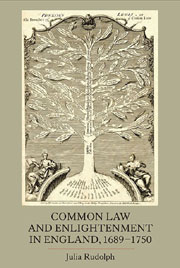Book contents
- Frontmatter
- Contents
- Acknowledgements
- Abbreviations
- 1 Against Decline
- 2 Law Books, Legal Knowledge and Enlightened Encyclopedism
- 3 Expertise and Evidentiary Practices in Science and Law
- 4 Common Law, Credit and the Growth of Commerce
- 5 Common Law Jurisprudence and the Philosophy of Natural Law
- 6 Common Law and the Morality of Markets
- 7 Legal Histories and Enlightened Historiography
- Conclusion
- Bibliography
- Index
- STUDIES IN EARLY MODERN CULTURAL, POLITICAL AND SOCIAL HISTORY
4 - Common Law, Credit and the Growth of Commerce
Published online by Cambridge University Press: 05 May 2013
- Frontmatter
- Contents
- Acknowledgements
- Abbreviations
- 1 Against Decline
- 2 Law Books, Legal Knowledge and Enlightened Encyclopedism
- 3 Expertise and Evidentiary Practices in Science and Law
- 4 Common Law, Credit and the Growth of Commerce
- 5 Common Law Jurisprudence and the Philosophy of Natural Law
- 6 Common Law and the Morality of Markets
- 7 Legal Histories and Enlightened Historiography
- Conclusion
- Bibliography
- Index
- STUDIES IN EARLY MODERN CULTURAL, POLITICAL AND SOCIAL HISTORY
Summary
English common law jurisprudence developed in the context of changes in eighteenth-century evidentiary practices and the growth of the adversary criminal trial. As the trial of Spencer Cowper, and appeal by Mary Stout, demonstrated, there were important connections made between contemporary ideas about objectivity, truth and fact, and contemporary conceptions of authority and justice. The judges' ruling on the matter of Stout's appeal also points to a second important arena for the development of common law jurisprudence in the eighteenth century: jurisdictional controversy between common law and equity. One indication of this controversy is given in the heated exchange between Justices Treby and Holt – and especially in Justice Holt's insistence that the lord keeper's, or lord chancellor's, discretion in granting a new writ of appeal must be informed by a deference to common law remedies, and by an appreciation for stability in common law judgments.
This kind of claim about the benefits of adherence to common law emphasised the justice of procedure and precedent but, as we know, Holt and others also recognised that injustice could sometimes result from too rigid an application of formal rules. In order to address such instances of potential injustice the king's chancellor had begun to exercise a judicial authority in his court of Chancery as early as the fourteenth century. Chancellors were meant to look to conscience, to principles of natural law and universal justice in order to fulfill the spirit of the law, and to rule on what was ‘right’.
- Type
- Chapter
- Information
- Common Law and Enlightenment in England, 1689-1750 , pp. 130 - 163Publisher: Boydell & BrewerPrint publication year: 2013



